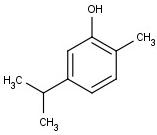|

|
|
Carvacrol: 5-isopropyl-2-methylphenol.
CAS: 499-75-2
|
Essential oils from plants have long been a component of home remedies, and even today are used for their aromatherapy, analgesic (e.g. cough drops), or antibacterial properties. Of course, the exact way they work is not completely understood. However, Hiroyasu Inoue and colleagues in Japan believed that many essential oils might target COX-2 much like compounds in wine and tea. So, they screened a wide range of commercially available oils and identified six (thyme, clove, rose, eucalyptus, fennel and bergamot) that reduced COX-2 expression in cells by at least 25%. Of these, thyme oil proved the most active, reducing COX-2 levels by almost 75%. When Inoue and colleagues analyzed thyme oil, they found that the major component - carvacrol - was the primary active agent; in fact when they use pure carvacrol extracts in their tests COX-2 levels decreased by over 80%.
Abstract Cyclooxygenase-2 (COX-2), the rate-limiting enzyme in prostaglandin biosynthesis, plays a key role in inflammation and circulatory homeostasis. Peroxisome proliferator-activated receptors (PPARs) are ligand-dependent transcription factors belonging to the nuclear receptor superfamily and are involved in the control of COX-2 expression, and vice versa. Here, we show that COX-2 promoter activity was suppressed by essential oils derived from thyme, clove, rose, eucalyptus, fennel, and bergamot in cell-based transfection assays using bovine arterial endothelial cells. Moreover, from thyme oil, we identified carvacrol as a major component of the suppressor of COX-2 expression and an activator of PPAR-alpha and gamma. Gamma-PPAR-dependent suppression of COX-2 promoter activity was observed in response to carvacrol treatment. In human macrophage-like U937 cells, carvacrol suppressed lipopolysaccharide-induced COX-2 mRNA and protein expression, suggesting that carvacrol regulates COX-2 expression through its agonistic effect on PPARgamma. These results may be important in understanding the antiinflammatory and antilifestyle-related disease properties of carvacrol.
|